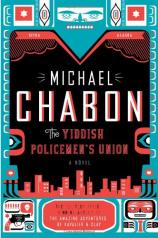The Yiddish Policemen's Union
Review
The Yiddish Policemen's Union
Imagine for a moment the world today if, instead of victory in
the 1948 Arab-Israeli War, the nation of Israel had suffered
defeat. Those Jews who had established residence in Palestine were
expelled from their homeland. They turned to the United States for
assistance and were awarded a portion of land in the territory of
Alaska in the Federal District of Sitka. Now, one-half century has
passed and a policy has been enacted by the U.S. that will evict
all Jews without recognized legal status from Sitka. Sovereignty
over that land where Yiddish is the official language and power is
exercised by Hasidic Jews will terminate on January 1, 2008.
This historical underpinning for THE YIDDISH POLICEMEN'S UNION is
but one of countless ironies that saturate the novel. Jews in
Alaska find themselves being treated in a fashion similar to
Palestinians in the contemporary Middle East. This is the universe
that Michael Chabon has created, the existence of which raises
countless provocative questions for Jews and Gentiles alike.
Lest readers believe that an Alaskan Jewish homeland is the
groundwork for a political novel, THE YIDDISH POLICEMEN'S UNION is
actually a detective saga in the 1940s style of Raymond Chandler
and Dashiell Hammett. Chabon's sleuth is Meyer Landsman, a
down-on-his-luck Sitka homicide cop called upon to investigate the
murder of a drug addict who resided in the same rundown hotel as
Landsman. The investigation takes the detective into a strange
world of Lubavitch Orthodox gangs and crime-boss rabbis.
The dead man who used the leather straps of his tefillin (Jewish
prayer artifacts) to tie off his arms prior to injecting heroin
into his veins was also the son of a powerful rabbi in Sitka. Like
any detective caught in an investigation where powerful people have
a vested interest in the outcome, Landsman and his partner, Berko
Shemets, must be full-time investigators and part-time diplomats.
Throughout the investigation Chabon reminds us of his constant
refrain, "It's a strange time to be a Jew."
Reading THE YIDDISH POLICEMEN'S UNION one cannot help but notice
the irony and complexity of Chabon's writing. The Jews of Sitka are
in many respects the Palestinians of the 21st century. They owe
their existence to the largess of others and know not what the
future portends. By focusing his novel on a Jewish character
toiling as a police detective, Chabon is seeking to establish for
readers that the true nation of Israel is a nation like all other
nations, where people toil in all professions seeking nothing more
than to be left alone in their daily endeavors. It cannot go
unnoticed that the protagonist of this novel is named Landsman, the
Yiddish word for a fellow countryman. Sitka, Alaska, the erstwhile
home of the Jewish nation, is where we all come from.
THE YIDDISH POLICEMEN'S UNION is one of those rare books that many
will think is remarkable, while some will find it intolerable. It
will offer different interpretations for different readers, and you
may have to read it more than once. There is no doubt, however,
that this book will be widely discussed in the coming months and
even years. In the future, Michael Chabon may be mentioned in the
same sentence with Phillip Roth, Saul Bellow and Bernard Malamud
for this work of enormous ambition and insight.
Reviewed by Stuart Shiffman on January 24, 2011
The Yiddish Policemen's Union
- Publication Date: May 1, 2007
- Genres: Fiction
- Hardcover: 432 pages
- Publisher: HarperCollins
- ISBN-10: 0007149824
- ISBN-13: 9780007149827




